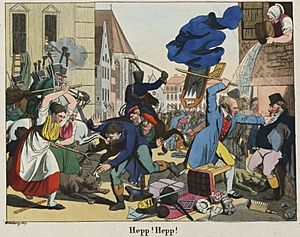Crime facts for kids

A crime is an action that goes against the laws of a country or area. When someone commits a crime, they are called a criminal. Laws are put in place to keep people safe and to make sure everyone is treated fairly.
The main idea behind calling something a "crime" is that it can cause harm or problems for others. For example, hurting another person, stealing their belongings, or even taking someone's life are considered crimes in most places. It can also be a crime to own or sell certain forbidden items, like illegal guns.
Sometimes, people who commit crimes make money from their illegal actions. They might try to hide where this money came from. This process is called money laundering. It makes it harder for the police to track the money and find out about the crime.
Contents
What is a Crime?
A crime is any action that breaks a rule set by the government. These rules are called laws. Laws help keep society organized and safe for everyone. If someone breaks a law, they might face punishment. This could be a fine, community service, or even time in jail.
Why Do We Have Laws?
Laws are important because they protect people and their property. They also help to solve disagreements peacefully. Without laws, there would be a lot of confusion and unfairness. Laws help to create a safe and orderly place for everyone to live. They ensure that people know what is expected of them and what will happen if they do something wrong.
Different Kinds of Crimes
Crimes can be very different from each other. Some crimes are small, like littering or speeding. Others are much more serious, like robbery or assault. The punishment for a crime usually depends on how serious it is.
Crimes Against People
These are actions that directly harm another person. Examples include:
- Assault: Hurting someone physically.
- Theft: Taking something that doesn't belong to you.
- Vandalism: Damaging someone else's property on purpose.
Crimes Against Property
These crimes involve damaging or taking someone's belongings.
- Burglary: Breaking into a building to steal things.
- Arson: Setting fire to property on purpose.
Crimes Against Society
Some crimes affect the whole community or country.
- Fraud: Tricking people to get money or property.
- Contraband: Having or selling illegal items.
How Are Crimes Investigated?
When a crime happens, the police usually investigate it. They gather evidence, talk to witnesses, and try to figure out who committed the crime. Their goal is to find the person responsible and bring them to justice.
The Role of Evidence
Evidence is very important in solving crimes. It can be anything from fingerprints and DNA to witness statements and video recordings. Police officers and detectives collect this evidence carefully. They use it to build a case against the person they believe committed the crime.
What Happens After an Investigation?
If the police find enough evidence, they might arrest a suspect. The suspect then goes through a legal process. A court decides if the person is guilty or innocent. If found guilty, the court decides on a fair punishment.
Images for kids
See also
 In Spanish: Crimen para niños
In Spanish: Crimen para niños


